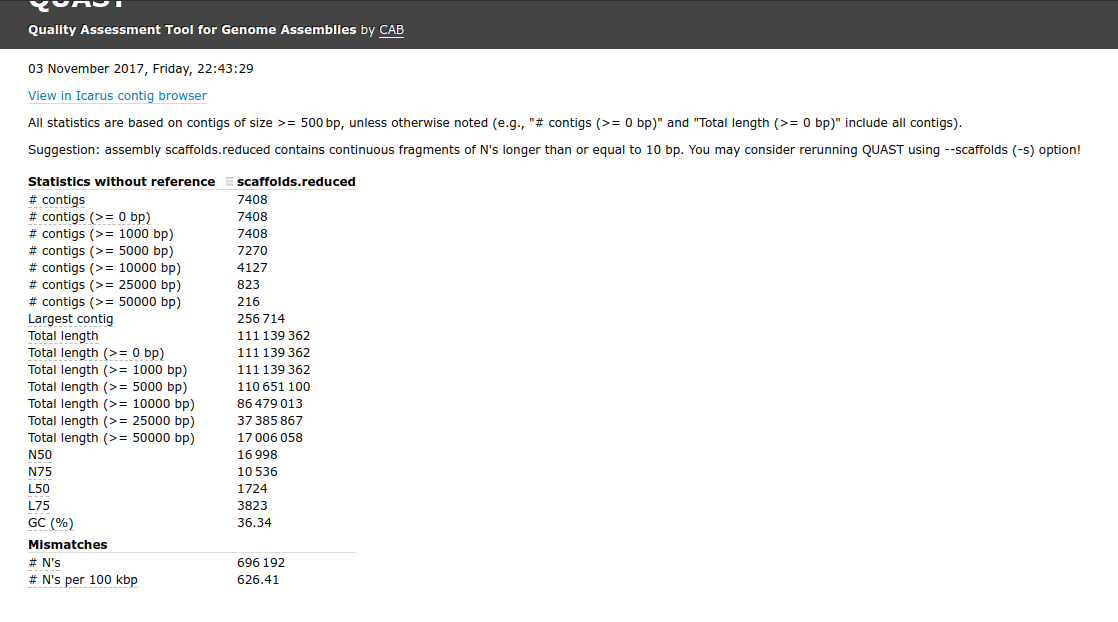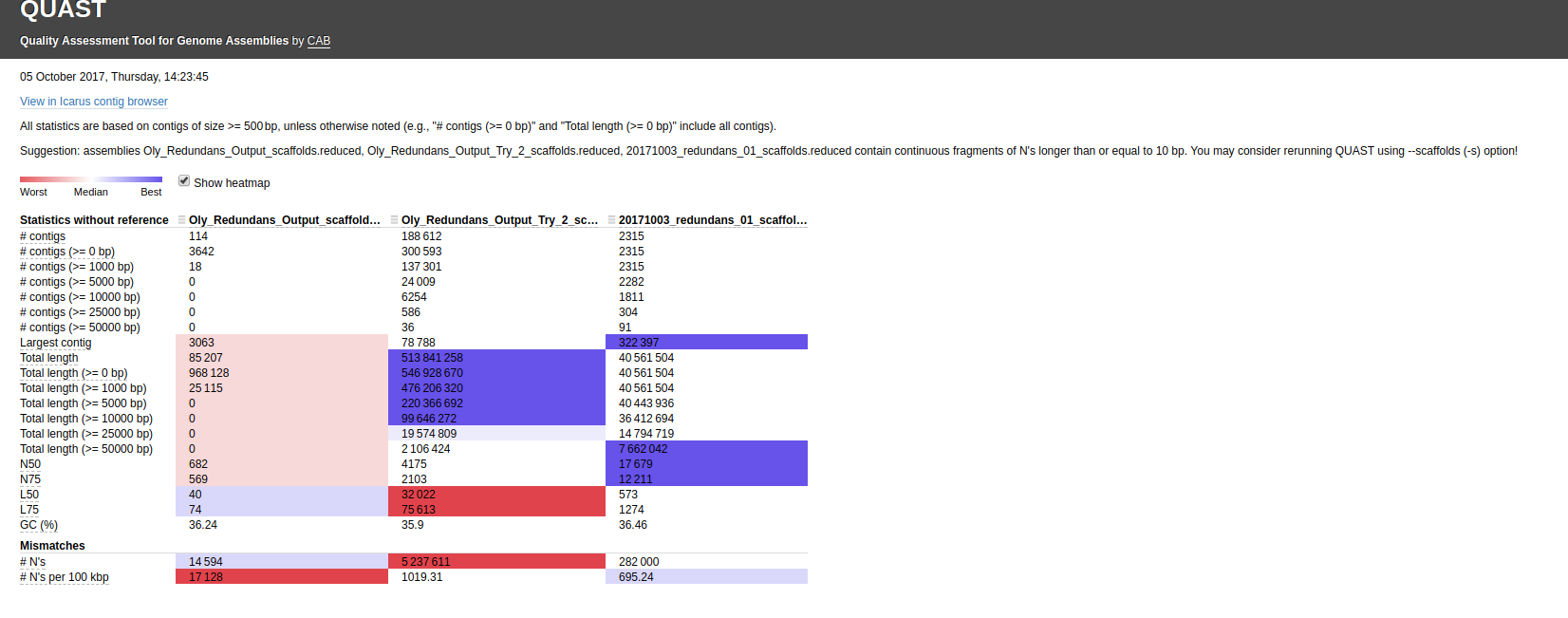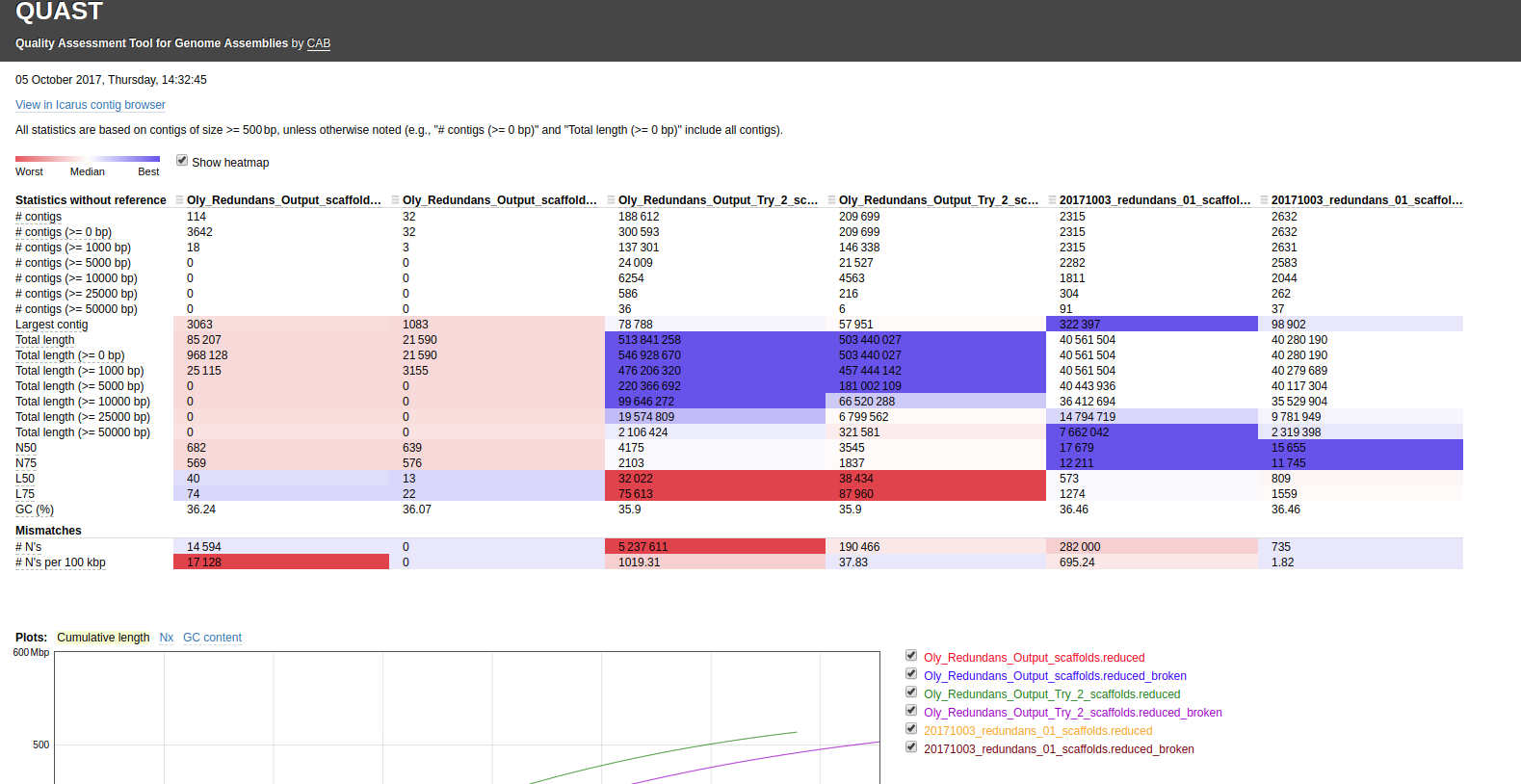Had problems with Docker and Jupyter Notebook inexplicably dying and deleting all the files in the working directory of the Jupyter Notebook (which also happened to be the volume mounted in the Docker container).
So, I ran this on my computer, but didn’t have Jupyter installed (yet).
This utilized the Canu contigs file (FASTA) that I generated on 20171018.
Here’s the input command:
sudo python /home/sam/software/redundans/redundans.py -t 24 -l m130619_081336_42134_c100525122550000001823081109281326_s1_p0.fastq.gz m170211_224036_42134_c101073082550000001823236402101737_s1_X0_filtered_subreads.fastq.gz m170301_100013_42134_c101174162550000001823269408211761_s1_p0_filtered_subreads.fastq.gz m170301_162825_42134_c101174162550000001823269408211762_s1_p0_filtered_subreads.fastq.gz m170301_225711_42134_c101174162550000001823269408211763_s1_p0_filtered_subreads.fastq.gz m170308_163922_42134_c101174252550000001823269408211742_s1_p0_filtered_subreads.fastq.gz m170308_230815_42134_c101174252550000001823269408211743_s1_p0_filtered_subreads.fastq.gz m170315_001112_42134_c101169372550000001823273008151717_s1_p0_filtered_subreads.fastq.gz m170315_063041_42134_c101169382550000001823273008151700_s1_p0_filtered_subreads.fastq.gz m170315_124938_42134_c101169382550000001823273008151701_s1_p0_filtered_subreads.fastq.gz m170315_190851_42134_c101169382550000001823273008151702_s1_p0_filtered_subreads.fastq.gz -i 151114_I191_FCH3Y35BCXX_L1_wHAIPI023992-37_1.fq.gz 151114_I191_FCH3Y35BCXX_L1_wHAIPI023992-37_2.fq.gz 151114_I191_FCH3Y35BCXX_L2_wHAMPI023991-66_1.fq.gz 151114_I191_FCH3Y35BCXX_L2_wHAMPI023991-66_2.fq.gz 151118_I137_FCH3KNJBBXX_L5_wHAXPI023905-96_1.fq.gz 151118_I137_FCH3KNJBBXX_L5_wHAXPI023905-96_2.fq.gz 160103_I137_FCH3V5YBBXX_L3_WHOSTibkDCABDLAAPEI-62_1.fq.gz 160103_I137_FCH3V5YBBXX_L3_WHOSTibkDCABDLAAPEI-62_2.fq.gz 160103_I137_FCH3V5YBBXX_L3_WHOSTibkDCACDTAAPEI-75_1.fq.gz 160103_I137_FCH3V5YBBXX_L3_WHOSTibkDCACDTAAPEI-75_2.fq.gz 160103_I137_FCH3V5YBBXX_L4_WHOSTibkDCABDLAAPEI-62_1.fq.gz 160103_I137_FCH3V5YBBXX_L4_WHOSTibkDCABDLAAPEI-62_2.fq.gz 160103_I137_FCH3V5YBBXX_L4_WHOSTibkDCACDTAAPEI-75_1.fq.gz 160103_I137_FCH3V5YBBXX_L4_WHOSTibkDCACDTAAPEI-75_2.fq.gz 160103_I137_FCH3V5YBBXX_L5_WHOSTibkDCAADWAAPEI-74_1.fq.gz 160103_I137_FCH3V5YBBXX_L5_WHOSTibkDCAADWAAPEI-74_2.fq.gz 160103_I137_FCH3V5YBBXX_L6_WHOSTibkDCAADWAAPEI-74_1.fq.gz 160103_I137_FCH3V5YBBXX_L6_WHOSTibkDCAADWAAPEI-74_2.fq.gz -f 20171018_oly_pacbio.contigs.fasta -o /home/data/20171024_docker_oly_redundans_01/This completed in just over 19hrs.
Copied output files to Owl: http://owl.fish.washington.edu/Athaliana/20171024_docker_oly_redundans_01/
Here’s the desired output file (FASTA): scaffolds.reduced.fa
Will add to our genome assemblies table.
Ran Quast on 20171103 for some assembly stats.
Quast output is here: http://owl.fish.washington.edu/Athaliana/quast_results/results_2017_11_03_22_43_06/




